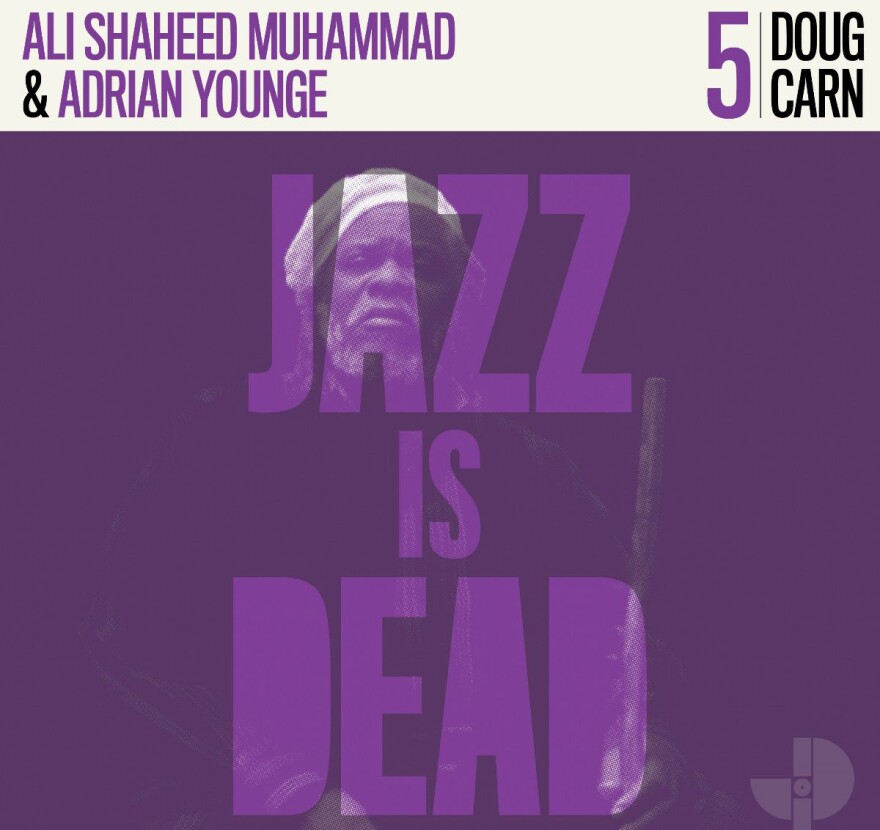February 1, 2021. If you take the fabric of time apart and stitch it back together, you might just find yourself in the realm occupied by Jazz Is Dead, the time and genre-bending album series produced by Adrian Younge and Ali Shaheed Muhammad. The latest installment in the Jazz Is Dead series is centered around one of the baddest Hammond organists from the ’70s, who generated a cult following for the albums he released on Oakland’s Black Jazz label.
His name is Doug Carn—you may know of his wife, Jean, a vocalist who’d become a solo R&B star for Gamble and Huff’s Philadelphia International Records. Younge and Muhammad, long fans of Carn’s work, call his Black Jazz releases, “All-time classics of Black consciousness as expressed through jazz.” So they jumped at the chance to work with him; Doug Carn JID005 is the result.
The multi-volume Jazz Is Dead project is one where worlds don’t collide so much as they sort of naturally coalesce, like globules of wax in a ’70s-era lava lamp. The result, especially here, is a thrilling, sometimes dizzying, often mesmerizing opportunity to occupy the past, present, and future all at once.
The music itself is spirited and evocative, and both nostalgic and futuristic—but much of the credit must go to Younge and Muhammad for making this clever concept a reality. These are two guys best known in hip-hop circles—Younge for having produced projects for acts like Ghostface Killah, Kendrick Lamar, and Souls of Mischief and Muhammad for his jack of many trades role in A Tribe Called Quest.
But many of their musical heroes are jazz musicians, and for years, they’d been involved in a hip-hop milieu that’s given second life to jazzers’ music through sampling the latter’s work from the ’60s and ’70s. But with the Jazz Is Dead series, Younge and Muhammad have flipped the script, ceding the foreground to the jazz musicians while retaining a hip-hop sensibility that traces part of its ancestry to organ-driven soul-jazz. It’s one of the those trippy everything-is-connected-if-you-just-listen-closely type things.
Does it work? It most assuredly does. Call it groove jazz, soul jazz, a fusion of hip-hop and funk-noir, or anything else—Younge, Muhammad, and Carn seem less concerned with the labels and more concerned with atmosphere.
From the opening cut, Doug Carn JID005 is a trip; every tune takes you someplace new and world-builds like a good piece of fiction. On the opener, “Dimensions,” Younge introduces an ascending chromatic scale on the Fender Rhodes electric piano that comes to permeate the entire piece. He’s soon joined by Shai Golan (sax) and Zach Ramacier (trumpet), who riff on that theme while Carn swells gradually and mischievously behind them and Muhammad (electric bass) and Malachi Morehead (drums) work together like The Roots’ Hub and QuestLove. As a listener, it’s like touring a psychedelic chocolate factory with a hip-hop Willy Wonka.
Meanwhile, “Processions,” the third track, opens similarly, with the horns playing ascending chromatics that make everything feel just slightly off-kilter, which is both deliberate here and par for the course. But the horns soon give way to the rhythm section’s steady groove, a sure-footed platform from which Carn solos while Younge supports with buttery Rhodes fills. By the time Morehead and Muhammad lay down cover for a Ramacier trumpet solo, I find myself, as a listener, injected into the storyline of a contemporary noir film set in early ’70s Southern California. If only this had been written before Paul Thomas Anderson adapted Inherent Vice for the screen.
“Windfall” comes off darker and more sinister; it’s also a little steadier. There’s nothing off-kilter to wrong foot the listener into a state of disorientation. Yet, a noirish quality remains. Though the atmosphere here is much more Frank Serpico’s New York City than Pynchon’s Manhattan Beach. The tune is highlighted by expressive solos and unison playing from Golan and Ramacier.
The heat really picks up, though, about halfway through; that’s where you’ll find the record’s first single, “Desert Rain.” Shot through with hip-hop style drum triplets and accents, Carn seems born again playing alongside these two horn players. All the while, Younge and his Rhodes are garnishing Carn’s runs on organ with electric stardust.
But all of the foregoing have just been appetizers, energy-wise, compared to “Underwater,” “Nunca Un Malandro,” and “Lion’s Walk,” three late-album tracks.
Fans of the Native Tongues, the loosely organized collective of ’90s hip-hop groups with a jazzy, intellectual bent, will love “Underwater,” a showcase for Morehead whose chemistry with Carn and Muhammad is as strong or stronger here than anywhere else on the record. Something about this one also has a distinctly Philly feel, the flavor of a rowhouse party or a basement recording studio session, where one guy wearing headphones mouths to another guy wearing headphones: “THIS is the sound.”
“Nunca Um Malandro,” underscores the notion that Brazilian influence on American music will never die—it’s been so influential to both Carn’s generation and Younge and Muhammad’s. This isn’t just house-party samba at its finest, it’s Younge and Carn’s most dialed-in partnership of the album, too. In general, I’m totally cool with the way Younge and Muhammad have arranged this album, though I’d have made this one my closer.
“Lion’s Walk,” meanwhile, brings Younge and Muhammad’s Jazz Is Dead concept full circle by featuring another of their heroes, alto saxophonist Gary Bartz. Carn is enlivened by the presence of a contemporary, while Morehead and Muhammad keep things sufficiently steady foundationally to allow the two vets to dialogue at a level of heightened sophistication and mutual understanding.
In many ways an unabashed nostalgia play, this one may not be for jazz lovers of all stripes, but the kids of the ’70s and ’90s are really going to dig it.
*******



